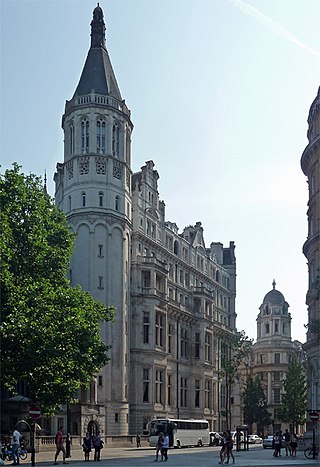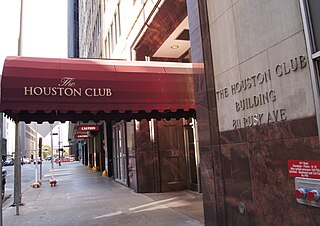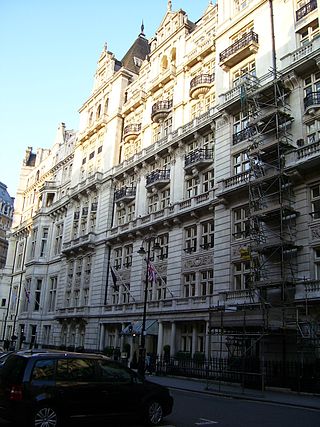
A club is an association of people united by a common interest or goal. A service club, for example, exists for voluntary or charitable activities. There are clubs devoted to hobbies and sports, social activities clubs, political and religious clubs, and so forth.

The Conservative Monday Club was a British political pressure group, aligned with the Conservative Party, though no longer endorsed by it. It also had links to the Democratic Unionist Party (DUP) and Ulster Unionist Party (UUP) in Northern Ireland.
The Young Conservatives (YC) is the youth wing of the Conservative Party in the United Kingdom for members aged 25 and under. The organisation shares the same values and policies as its parent political party with branches being an integrated part of local associations. College and university branches are not included, but run independently.

The Carlton Club is a private members' club in the St James's area of London, England. It was the original home of the Conservative Party before the creation of Conservative Central Office. Membership of the club is by nomination and election only.

A gentlemen's club is a private social club of a type originally established by old boy networks, typically from Britain's upper classes from the 17th century onwards.

The National Liberal Club (NLC) is a London private members' club, open to both men and women. It was established by William Ewart Gladstone in 1882 to provide club facilities for Liberal Party campaigners among the newly enlarged electorate following the Third Reform Act in 1884, and was envisioned as a more accessible version of a traditional London club.

The Devonshire Club was a London gentlemen's club which was established in 1874 and was disbanded in 1976. Throughout its existence it was based at 50 St James's Street. The major Liberal club of the day was the Reform Club, but in the wake of the Reform Act 1867's extension of the franchise, the waiting list for membership from the larger electorate grew to such an extent that a new club was formed to accommodate these new Liberal voters. The clubhouse was on the western side of St James's Street. The original intention was to call it the 'Junior Reform Club', along the model of the Junior Carlton Club formed in 1866, but complaints from the Reform Club's members led it to being named the Devonshire, in honour of its first chairman, the Duke of Devonshire, an aristocrat from a long line of Liberals.

A social club or social organization may be a group of people or the place where they meet, generally formed around a common interest, occupation or activity with in an organizational association known as a club. Examples include book discussion clubs, chess clubs, country clubs, final clubs, fishing clubs, gaming clubs, women's clubs, gentlemen's clubs, hunting clubs, military officers' clubs, political clubs, religious clubs, traditional fraternal organizations, service clubs, fraternities and sororities, business networking clubs, science clubs, hobbyist clubs, informal professional associations, and university clubs. The term can also refer to a criminal headquarters, such as the Ravenite Social Club or the Cage.

The Oxford Students Liberal Association, formerly, Oxford University Liberal Democrats is the student branch of the Liberal Democrats for students at the University of Oxford, with the purpose of promoting liberalism, liberal values, the Liberal democrats and a spirit of cross party collaboration.

St Stephen's Club was a private member's club in Westminster, London, founded in 1870.

The Constitutional Club was a London gentlemen's club, now dissolved, which was established in 1883 and disbanded in 1979. Between 1886 and 1959 it had a distinctive red and yellow Victorian terracotta building, designed by Robert William Edis, at 28 Northumberland Avenue, off Trafalgar Square.
The Unionist Club was a short-lived London gentlemen's club, now dissolved, which was established in 1886, and had wound up by 1892. For the last four years of its existence, it had a clubhouse at 66-68 Pall Mall.

The Junior Carlton Club was a London gentlemen's club, now dissolved, which was established in 1864 and was disbanded in 1977.
The National Union was a short-lived political London gentlemen's club founded in 1887. It was aligned to the recently created Liberal Unionist party which had been created by the Home Rule issue. By 1890, it was reported by Whittakers Almanack to have around 1,200 members, but like the similar Unionist Club, it had difficulties establishing a membership base. Its history proved to be short, and it was disbanded before 1900.
The Junior Constitutional Club was a political London gentlemen's club founded in 1887, and located at 101 Piccadilly. It was aligned to the Conservative party, with members having to pledge support. Heavy over-subscription for the Constitutional Club which had opened in 1883 led to the creation of a further mass-membership Conservative club.
The Primrose Club was a short-lived political London gentlemen's club founded in 1886 and located at 4-5 Park Place, St. James's. It was aligned to the Conservative party, with members having to pledge support. It was launched as a bid to combine the explosion of the popularity of clubs in London at the end of the nineteenth century with the phenomenal success of the Conservative-aligned Primrose League.
The Palace Club was a short-lived political London gentlemen's club founded in 1882. It was aligned to the Conservative party, with members having to pledge support. Unlike many of the better-established clubs like the Carlton, or some of the new clubs like the Constitutional, it never acquired a sizable membership; according to Whittakers Almanack it had only 220 members in 1890, and 250 by 1900. It closed within a decade.
The Eighty Club was a political London gentlemen's club named after the year it was founded, 1880. It was strictly aligned to the Liberal Party, with members having to pledge support to join. Somewhat dwarfed by mass-membership clubs like the National Liberal Club, it could only claim 400 members in 1890, and 600 by 1900.

The 1920 Club was a short-lived London ladies and gentlemen's club, which existed in the 1920s.

The Social Democratic Party (SDP) was a centrist to centre-left political party in the United Kingdom. The party supported a mixed economy, electoral reform, European integration and a decentralised state while rejecting the possibility of trade unions being overly influential within industrial relations. The SDP officially advocated social democracy, and unofficially for social liberalism as well.












